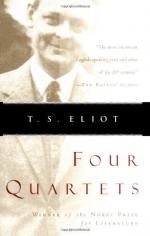
|
| Name: _________________________ | Period: ___________________ |
This test consists of 5 short answer questions, 10 short essay questions, and 1 (of 3) essay topics.
Short Answer Questions
1. Part V of "Little Gidding" states that "while the light fails / On a winter's afternoon, in a secluded chapel / History is now and" what?
2. It is said in the second part of "The Dry Salvages" that when one becomes older it seems as though "the past has another pattern, and ceases to be a" what?
3. In the final sentence of the third part of "The Dry Salvages," the speaker says, "Not fare well, but fare" what," voyagers"?
4. The last two lines of Part IV of "Little Gidding" state that "We only live, only suspire / Consumed by either" what or what?
5. The speaker's interlocutor in Part II of "Little Gidding" says that "next year's words await another" what?
Short Essay Questions
1. What is meant by the statement in Part II of "Little Gidding" that "Water and fire deride / The sacrifice that we denied"?
2. What is significant about the speaker's discussion of the strangeness of the sea in relation to man, in Part I of "The Dry Salvages"?
3. What is meant by the speaker's interlocutor's phrase that "next year's words await another voice" in Part II of "Little Gidding"?
4. What does the speaker mean by saying in Part I of "Little Gidding" that "prayer is more / Than an order of words, the conscious occupation / Of the praying mind, or the sound of the voice praying"?
5. Why would anyone passing "this way" "have to put off / Sense and notion" in Part I of "Little Gidding"?
6. Explain what is meant by the paradoxical statement in Part V of "The Dry Salvages," "music heard so deeply / That it is not heard at all."
7. What does the speaker mean in Part III of "The Dry Salvages" when he states that, "the future is a faded song, a Royal Rose or a lavender spray / Of wistful regret for those who are not yet here to regret"?
8. What characterizes the "gifts reserved for age" which the interlocutor of Part II of "Little Gidding" describes to the poem's speaker?
9. What is meant by the line, "You are not the same people who left that station," in Part III of "The Dry Salvages"?
10. Why is the "strong brown god" of Part I of "The Dry Salvages" "almost forgotten / By the dwellers in cities"?
Essay Topics
Write an essay for ONE of the following topics:
Essay Topic 1
Part V of "The Dry Salvages" sees the speaker discuss the essential, inherent need of human persons for faith. Analyze this discussion in an essay both expository and critical. What is faith? Why is faith important? What sort of things do human persons ordinarily seek as objects of faith? Why do people seek this faith? Why, in the estimation of the speaker, are these common objects and common faiths unsatisfactory? What sort of faith is satisfactory? In what does this sort of faith consist? Who possesses this faith? What does this indicate about the nature of faith? What does this indicate about the nature of the human person in regards to faith and fulfillment?
Essay Topic 2
Part IV of "The Dry Salvages" is written as though a prayer to the intercession of the Blessed Virgin. This demonstrates a deep relationship between prayer and poetry, both in structure and content. In an insightful essay, analyze this relationship as it is presented in the poem. What is prayer? What is poetry? How are the two alike one another? How are they distinct? In what essence are they united? How is the prayer in Part IV poetical? How is the poetry throughout the work often like a prayer? Why is poetry particularly suitable to prayer? How does this relationship illuminate interpretation of the whole of The Four Quartets?
Essay Topic 3
One of the principal themes in the final part of "Burnt Norton" is the relationship between words, music, and pattern and form. Analyze this relationship in a thoroughly developed critical essay. In what does the relationship consist? How is the relationship significant? What are some instances of the way in which the relationship exists? Can any words or music exist without pattern and form? How does form enable words and music to "reach / The stillness"? What does this imply about the nature of pattern and form? What does it reveal about the natures of music and words?
|
This section contains 1,190 words (approx. 4 pages at 300 words per page) |

|




